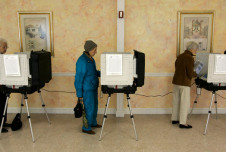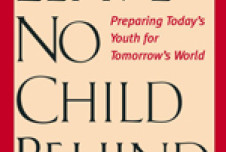When Greater Good senior editor Jeremy Adam Smith interviewed two leading scientists, Steven Pinker and Michael S. Gazzaniga, about trust, science policy, and the Bush Administration, he discovered two different perspectives. The Q&A with Pinker will appear in the forthcoming Fall 2008 issue of Greater Good, which focuses on trust, but given the timeliness and controversial nature of the issues discussed, we have decided to run both interviews on this blog, to form a kind of dialog. We invite reader comments.
As cognitive psychologist Steven Pinker says in his Q&A with Greater Good magazine, he was initially skeptical of claims that the Bush administration is more anti-science than previous ones.
"But I have now been turned around," he says, "and I see that the accusations are correct, that there is a Republican war on science, and that it does seem unprecedented."
At the twilight of the Bush administration, Pinker's view is commonplace among scientists. But not everyone agrees, including neuroscientist Michael S. Gazzaniga.
Gazzaniga is the director of the University of California–Santa Barbara's SAGE Center for the Study of the Mind, as well as its Summer Institute in Cognitive Neuroscience. Famed for his discoveries in how the two halves of the human brain communicate with one another, Gazzaniga has also been active as a public intellectual. His popular science books include The Social Brain, The Ethical Brain, and, most recently, Human: The Science Behind What Makes Us Unique.
But in 2001, Gazzaniga stepped into a much more political realm when he was appointed to President Bush's Council on Bioethics, which quickly became a lightning rod for controversy. In his interview with Greater Good, for example, Steven Pinker accuses the Council of having been "packed with cultural conservatives and opponents of biomedical research, with a concerted effort to exaggerate the downside of biomedical research and to play up the fears."
As he makes clear in the following Q&A, Gazzaniga sees such criticisms as exaggerated. Speaking from his perspective as a member of the Council, Gazzaniga talked with Greater Good via email about science, politics, belief, and why our stuff works.
Greater Good: Many social surveys show that Americans' trust in professions, institutions, and each other has declined or wavered, and yet trust in science and scientists remains high. Do you think this trust is justified?
Michael Gazzaniga: There should be complete trust in science and the vast majority of scientists toil at getting things right and true. Occasionally, hyperbole and excited claims turn out to be over the top. But it is the business of science to check and double check and get things right. So there is a self-correcting aspect to science. A finding has to be true and valid for everyone which is why science is so wonderful an enterprise.
Q: And yet polls also routinely reveal that a majority of people believe God created humans in their current form, which implies that they either aren't listening to what science has to say or just don't believe scientists when they say that life on earth has evolved over millions of years. How can we explain this paradox, that most people trust in science and yet at the same time most people appear to embrace ideas that contradict the scientific evidence?
MG: I think that if a hundred human beings like us were deposited on Earth and only learned science as we now know it, a great number of them would wind up cooking up some kind of belief of a spiritual nature. We are belief-generating machines. We do it at the drop of a hat, little metaphors to get us through the day. For example, some people say, "My country, right or wrong." What does that mean? Yet we say such things. The number of contrary beliefs we carry around in our minds is startling.
Surveys vary on the number of trained scientists who claim to believe in God or at least something larger than themselves. On this question the dazzling intelligence of Francis Collins, head of the genome project and a man that understands science, evolution, and all the rest, does not prevent him from becoming a believer. Sir John Eccles, the Nobel Laureate in neuroscience was very much a believer. The list is actually fairly long.
It makes little sense to me but never underestimate the power of myth. As Joseph Campbell said, "That which is beyond even the concept of reality, that which transcends all thought. The myth puts you there all the time, gives you a line to connect with that mystery which you are."
Since no one currently has the slightest idea how to explain how we get mind out of brain, believers in something beyond the here and now are not going away.
GG: You're a member of President Bush's Council on Bioethics, which has been embroiled in a number of controversies over stem-cell research, genetic manipulation, and so on, and critics have charged that the administration is putting politics and religion ahead of scientific evidence. From your perspective as a member of the Council on Bioethics, do you think that criticism is justified?
MG: There are two levels to this question.
First, did I experience any political influence on my thinking or on my capacity to express my own opinion, which on the whole was quite contrary to many of those on the Council? I did not.
Second, was there a prior bias built into the Council by virtue of who was asked to serve? That may well be the case, but it was surely not all that evident on the major issue the Council faced in the first six months—stem cell research. There were some participants who were surely against it from the start and there were others who were surely for it. Most were uniformed and undecided about the issue at the beginning. As the mutual education went forward, decisions and viewpoints were established.
At the end, it all came down to two different votes. There was a vote on reproductive cloning and a second vote on biomedical cloning. All of us voted for a ban on reproductive cloning, which is not a huge surprise. On the key issue of biomedical cloning, however, seven members wanted to ban that as well. Seven others, myself included, were for it, given regulations were put in place. Additionally, three other members had no moral problem with cloning for biomedical purposes but wanted a moratorium in place until regulations were written.
So, 10 of the 17 members were in fact for biomedical cloning and had no moral problem. I am not sure that was what the organizers of the Council had in mind when they chose us, but that is what came out of six months of discussion.
Many of the arguments that seemed to enlighten the conversations were both of a scientific nature. In the end, these arguments were publicized and used by others. So in the end, I think the Council played a role that was positive. One has to go into the details to get the whole story. I am sure the next President's Council will have its own bias reflecting the social and political beliefs of the new President.
On the key question of the embryo, it is not a scientific question at stake. It is a belief about what moral status to assign an embryo. That has nothing to do with science.
GG: And yet it must be admitted that the criticism of the administration has been unusually sharp and the science highly politicized, with politicians, including Bush, raising fundamental questions about the scientific evidence behind evolution or global warming. What lasting impact, if any, might the administration have on Americans' levels of trust in science and scientific institutions?
MG: I don't think the issue of trust in science has anything to do with this administration or any other administration. Everyone is always looking for a scapegoat, and when things happen on your watch, needless to say, you are blamed or honored, depending on the event in question.
Using scientific methods is highly productive and the best way to figure out nature and its problems. If anybody stopped to think about their daily life, they would find they deeply trust science. Stuff works—your shelter, food supply, medical attention, cell phone, computers, space shuttles, and on and on—they're all derived from basic science.
Again, when people start complaining about science, it is usually because hyperbolic scientists are claiming too much for their discoveries, and it eventually backfires on all of us. Yet it is the process of science that in the end straightens all of this out.
I do think the public does not understand one fundamental truth about scientific research. It is enormously expensive and has a small yield. I have heard the figure of one percent yield for good scientific results on particular projects. For your average accountant and manager, that is hard to swallow. The managers, the people that have taken over our lives in every kind of institution, simply don't understand such low yields, and to compensate for this reality, tack on all sorts of other obligations for deliverables. Yet what we must all remember, when the one percent hits, such as with the invention of transistors or antibiotics, the world is changed forever.
At any rate, the need for more money in science is self-evident and when it is not always forthcoming, people worry that there is a trust problem. I think the problem lies more with the foregoing issue.
GG: What should citizens watch out for when it comes to the government's role in science? What are obvious red flags?
MG: Regulating everything has become an industry and only has limited value. As I have said, I believe science usually rights its own ship and every effort should be made to keep government out of the workings of science as much as possible. When the stem cell controversy was brewing, there was a great interest in having it all regulated by the federal government. At the time, it was pointed out that the Asilomar conference on Recombinant DNA organized by Paul Berg in 1975 set straight the policies that remain in effect today. It was voluntary and the government stayed out of it.
On a larger level, current government agencies that manage a great deal of our science funding are themselves culprits in the process of supporting creative research. Intolerable meddling in the production of good science is commonplace, and when individual scientists become frustrated with all the regulatory sideshows imposed on them by a particular agency, they begin to think life would be better if all of science fell into one agency. Somehow, they come to think that one understanding agency would solve their problems.
Of course, nothing could be further from the truth. Regulations, strategic planning, and all the other management concepts would then be united under one roof, and opportunities for independence would be stifled. Currently, there are many sources of funding, each with its own set of problems. However, what funding agency A hates may be acceptable at agency B. So, if one hears about a plan to put it all under one agency, it is time to speak out. That would be a red flag for sure.
Part I of "Truth in the Balance," an interview with cognitive psychologist Steven Pinker, can be read here.
Readers can sign up here for a trial subscription to Greater Good, starting with this special issue on trust.





Comments
It has become a matter of concern in the medical oncology research community that the significant decrease in government funding in the last several years, has left us with the pharmaceutical industry as the main financial source of research funding. Can you say, conflict of interest? “me too” drugs enhance their revenue, but are truly nothing new.
Melissa | 8:57 am, October 8, 2008 | Link